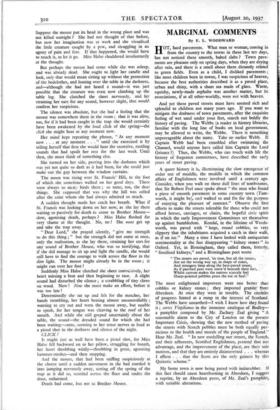MARGINAL COMMENTS
By E. L. WOODWARD
HOT, hard pavements. What man or woman, coming in from the country to the towns in these last ten days, has not noticed these smooth, baked slabs ? Town pave- ments are pleasant only on spring days, when they are drying after rain, and there is a smell about them distantly related to green fields. Even as a child, I disliked pavements ; like most children born in towns, I was suspicious of heaven, because the best authorities described it as a paved place, urban and shiny, with a sham sea made of glass. Warm, squishy, newly-made asphalte was another matter, but its associations, if at all other-worldly, were not with heaven.
And yet these paved streets must have seemed rich and splendid to children not many years ago. If you want to mitigate the drabness of town pavements, after the exquisite feeling of wet sand under your feet, search out boldly the history of paving. The Webbs (a reader in history libraries, familiar with the long line of books on local government, may be allowed to write, the Webbs. There is something unpeerageable about the name. Take an earlier Webb. If Captain Webb had been ennobled after swimming the Channel, would anyone have called him Captain the Lord Grisnez ?) Thus, the Webbs, who can touch with life the history of forgotten committees, have described the early years of street paving.
A queer history it is, illuminating the slow emergence of order out of muddle, the muddle in which the common affairs of Englishmen were involved until a century ago. Consider, when you walk on these dull lines of tombstones, that Sir Robert Peel once spoke about " the man who found a piece of smooth pavement in some country town (Tam- worth, it might be), and walked to and fro for the purpose of enjoying the pleasure of contrast." Observe the first efforts to make the streets tolerable for those who could not afford horses, carriages, or chairs, the hopeful civic spirit in which the early Improvement Committees set themselves up against bumbledom. Kendal, in the lifetime of Words- worth, was paved with " large, round cobbles, so very slippery that the inhabitants acquired a catch in their walk, as if on ice." Many a time I have looked with antiquarian sentimentality at the fast disappearing " kidney stones " in Oxford. Yet, in Birmingham, they called them, bitterly, " fossilised kidneys," and a Birmingham poet wrote
" The streets are paved, 'tis true, but all the stones, Are set the wrong way up, in shape of cones, And strangers limp along the best-paved street, As if parched peas were strew'd beneath their feet, Whilst custom makes the natives scarcely feel Sharp-pointed pebbles press the toe or heel."
The most enlightened improvers went one better than cobbles or kidney stones ; they imported granite from Aberdeen. At once they were in trouble. The enemies of progress hinted at a ramp in the interest of Scotland. The Webbs have unearthed—I wish I knew how they found it ; sortes Virgilianae in the immense catalogue of Bodley- a pamphlet composed by Mr. Zachary Zeal giving " A seasonable alarm to the City of London on the present Important Crisis, shewing that the new method of paving the streets with Scotch pebbles must be both equally per- nicious to the health and morals of the people of England." Hear Mr. Zeal. " In new modelling our streets, the Scotch, and their adherents, Scotified Englishmen, pretend that our advantage, and the improvement of the place, are their sole motives, and that they are entirely disinterested . . . whereas I affirm . . . that the Scots are the only gainers by this Quixotic scheme."
My home town is now being paved with indiarubber. If this fact should cause heartburning in Aberdeen, I suggest a reprint, by an Aberdeen press, of Mr. Zeal's pamphlet, with suitable alterations,






































 Previous page
Previous page